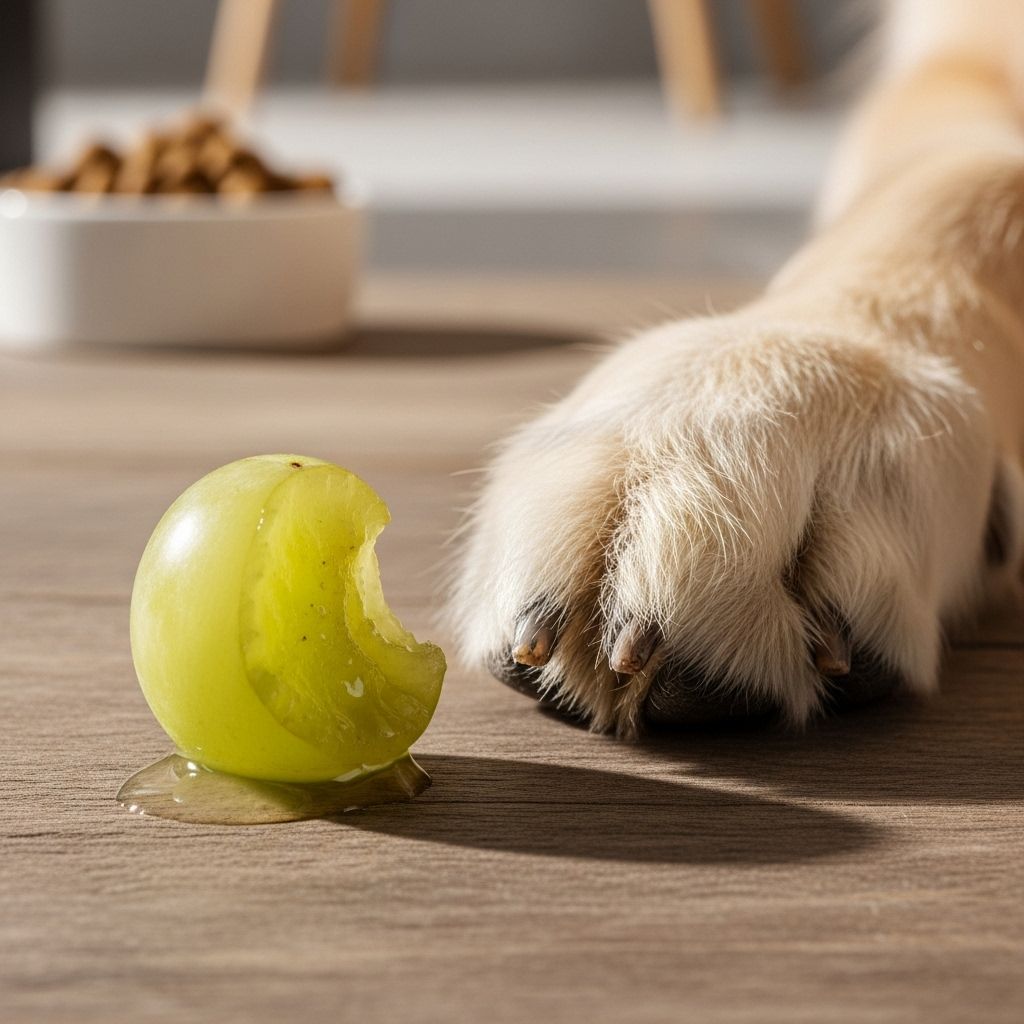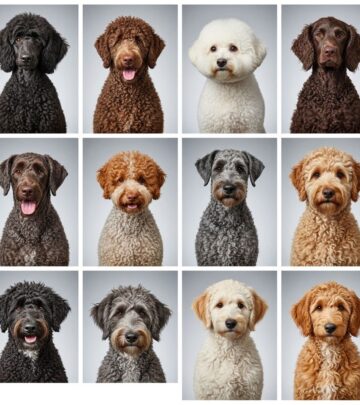Can Dogs Eat Grapes? The Truth About Grape Toxicity In Dogs
One small snack fruit can cause sudden kidney failure in pets, making quick action vital.

Can Dogs Eat Grapes?
For decades, grapes have been a staple in many households as a healthy snack. Yet, what many pet owners don’t realize is that grapes and raisins are dangerously toxic to dogs. Regardless of breed, age, or sex, dogs can experience severe—and sometimes fatal—reactions to eating even a small amount of grapes or their dried varieties, including raisins, currants, and sultanas.
Why Are Grapes Bad for Dogs?
Grapes contain substances that can cause acute kidney failure in dogs. Recent research points to tartaric acid as a potential culprit, but the exact toxic compound has not been conclusively identified. This uncertainty makes grapes highly unpredictable as a toxic risk, with some dogs reacting severely to just one grape, while others may show no symptoms.
- Toxic Compounds: Both grape flesh and skin can be poisonous, and toxicity may be worsened in their dried forms like raisins, where dangerous chemicals are more concentrated.
- Unpredictable Sensitivity: Sensitivity varies from dog to dog; there is currently no safe number of grapes for any canine.
- Other Grape Products: Foods containing grapes and raisins (e.g. Christmas cake, trail mix, hot cross buns) can also be harmful.
- Choking Hazard: Beyond toxicity, grapes pose a physical choking risk for small dogs due to their shape and size.
Can a Single Grape Kill a Dog?
Yes; even one grape or raisin can potentially be fatal. While not every dog will be affected identically, owners must assume there is no safe threshold for grapes and raisins. Consumption can lead to sudden kidney failure or death, so caution is paramount.
Signs and Symptoms of Grape Toxicity in Dogs
Symptoms of grape or raisin ingestion in dogs can appear within hours and develop quickly. Recognize the following key signs to expedite medical intervention:
- Early Symptoms:
- Vomiting and/or diarrhea (often within a few hours of exposure)
- Lethargy, weakness, unusual stillness
- Loss of appetite
- Abdominal pain (dog may be tender when touched)
- Progressive Signs:
- Dehydration (indicated by panting, dry nose/mouth, pale gums)
- Increased or decreased thirst, altered urination
- Decreased or absent urine output (anuria—a critical sign of kidney injury)
- Kidney failure (acute, sometimes leading to death)
Quick Tip: To check for dehydration, gently lift the skin at the back of your dog’s neck. If it doesn’t spring back promptly, your dog may be dehydrated.
Mechanism of Toxicity: What Happens When Dogs Eat Grapes?
Veterinary research suggests that exposure to toxic compounds, possibly tartaric acid or tartrate, causes cellular damage in the kidneys. The most common observable effect is renal tubular necrosis—the death of cells in kidney tubules. In some cases, pathologists have identified a unique golden-brown pigment accumulating in kidney cells, though exact mechanisms remain unclear.
The unpredictable nature of grape toxicity, combined with variation in dog sensitivity, makes it impossible to forecast outcomes following ingestion. For this reason, most veterinarians recommend zero tolerance for grapes and related dried fruits for all dogs, regardless of age, breed, or underlying health status.
Related Foods: The Danger of Raisins, Currants, and Sultanas
- Raisins are dried grapes and can be even more dangerous due to concentration of toxins.
- Currants and Sultanas also fall under this category, posing similar and sometimes greater risks.
- Baked Goods commonly containing these ingredients (fruitcake, festive treats) should be kept strictly out of reach of dogs.
What Should You Do If Your Dog Eats Grapes?
If you suspect your dog has ingested grapes, raisins, or foods containing them, immediate action is necessary:
- Contact your veterinarian or a pet poison control center as soon as possible. Time is critical: symptoms can escalate rapidly and delay can be fatal.
- Do NOT induce vomiting at home unless specifically instructed by a veterinary professional. Inappropriate attempts can cause further harm, especially if the dog is unconscious or showing severe symptoms.
- Provide as much information as possible to the vet: how much was eaten, when, and any symptoms present.
- Follow your veterinarian’s directions for emergency intervention, which may include:
- Inducing vomiting under controlled circumstances
- Administering activated charcoal to bind toxins
- Hospitalization for IV fluids to support kidney function
- Monitoring urine output and performing bloodwork
Prevention: How to Keep Your Dog Safe From Grape Toxicity
- Store grapes and raisins securely out of reach of pets and children.
- Educate family and visitors about the risk. Inform pet sitters, houseguests, and especially children not to offer grapes as treats.
- Be vigilant outdoors: When walking your dog, watch for fallen grapes (especially during harvest seasons) or discarded snacks in public areas.
- Pet-proof your kitchen and snack areas: Avoid leaving bowls of fruit within reach of curious dogs.
- Double-check ingredients in baked goods, cereals, and snack mixes before sharing with your pet.
Table: Common Foods Containing Grapes or Raisins That Are Hazardous for Dogs
| Food/Product | Hazard | Notes |
|---|---|---|
| Grapes (all varieties) | Toxicity, choking hazard | Never safe; includes peeled or seedless |
| Raisins | High toxicity | Dried form may increase risk |
| Currants/sultanas | Toxicity | Also dried grape family |
| Fruitcake | Toxicity | Often contains multiple dried fruits |
| Trail mix | Toxicity | Check ingredients for hidden raisins |
| Hot cross buns, holiday baked goods | Toxicity | Festive treats can contain raisins/currants |
Healthy Alternatives to Grapes for Dogs
If you’re looking for fruit-based treats, consider safe fruits in moderation:
- Blueberries
- Apples (core and seeds removed)
- Bananas
- Watermelon (seedless)
- Strawberries
Always introduce any new treat gradually and in small quantities, and confirm safety if unsure.
Myth vs. Fact: Grapes and Dogs
| Statement | Fact or Myth? | Explanation |
|---|---|---|
| All dogs will get sick if they eat grapes. | Myth | Not every dog reacts, but risk is unpredictable—zero tolerance is safest. |
| A single grape cannot harm my large dog. | Myth | There’s no proven safe threshold; even one grape can trigger toxicity. |
| Raisins are more dangerous than grapes. | Fact | Toxic compounds are more concentrated when fruit is dried. |
| Cooking or baking destroys the toxins. | Myth | Toxicity remains, regardless of preparation. |
Frequently Asked Questions (FAQs)
Q: Why are grapes and raisins toxic to dogs?
A: The exact toxin is believed to be an organic acid like tartaric acid, but research is ongoing. These compounds impair kidney function and can trigger acute renal failure.
Q: Can a single grape kill a dog?
A: Yes. Some dogs have died after eating only one grape or raisin. Due to unpredictable sensitivity, assume no safe amount for any dog.
Q: Are cats and other pets at risk?
A: Grapes and raisins are toxic to cats as well. Keep these fruits out of reach of all pets.
Q: What should I do if my dog eats grapes?
A: Contact your veterinarian immediately. Prompt action can be life-saving; do not wait for symptoms to appear.
Q: Is it safe to give my dog grape-flavored treats?
A: Only if the treat is artificial and contains no real grape product. Check ingredients carefully and always consult your veterinarian if unsure.
Q: What about grape seed extract supplements?
A: Although grape seed extract is sometimes used in human supplements, its safety for dogs is unproven. Avoid giving any grape-derived supplement unless directed by a veterinary professional.
Q: Are some breeds more at risk?
A: Toxicity affects all breeds equally. Age, sex, and breed do not change the risk profile for grape poisoning.
Q: What is the prognosis after grape poisoning?
A: If treatment is rapid and kidney damage has not set in, prognosis can be good. Acute kidney failure, however, can be fatal and may necessitate extended hospitalization or intensive care.
Conclusion: Zero Tolerance for Grapes in Dog Diets
Given the unpredictable danger and potentially fatal outcomes, the safest approach is to never feed your dog grapes, raisins, currants, or foods containing these fruits. Dog owners should educate families and caregivers, practice vigilance at all times, and act immediately if accidental ingestion occurs. If in doubt, consult your veterinarian for advice on pet-safe treats and foods.
References
- https://www.petmd.com/dog/nutrition/can-dogs-eat-grapes
- https://www.akc.org/expert-advice/nutrition/can-dogs-eat-grapes/
- https://www.thekennelclub.org.uk/health-and-dog-care/health/health-and-care/a-z-of-health-and-care-issues/can-dogs-eat-grapes/
- https://us.ziwipets.com/blogs/digestive-health/grape-toxicity-in-dogs
- https://en.wikipedia.org/wiki/Grape_toxicity_in_dogs
- https://www.purina.com/articles/dog/feeding/can-dogs-eat/grapes
- https://www.quakershillvethospital.com.au/dogs/grape-toxicity-in-dogs/
- https://vcahospitals.com/know-your-pet/grape-raisin-and-currant-poisoning-in-dogs
- https://www.carecredit.com/well-u/pet-care/can-dogs-eat-grapes/
Read full bio of Sneha Tete












